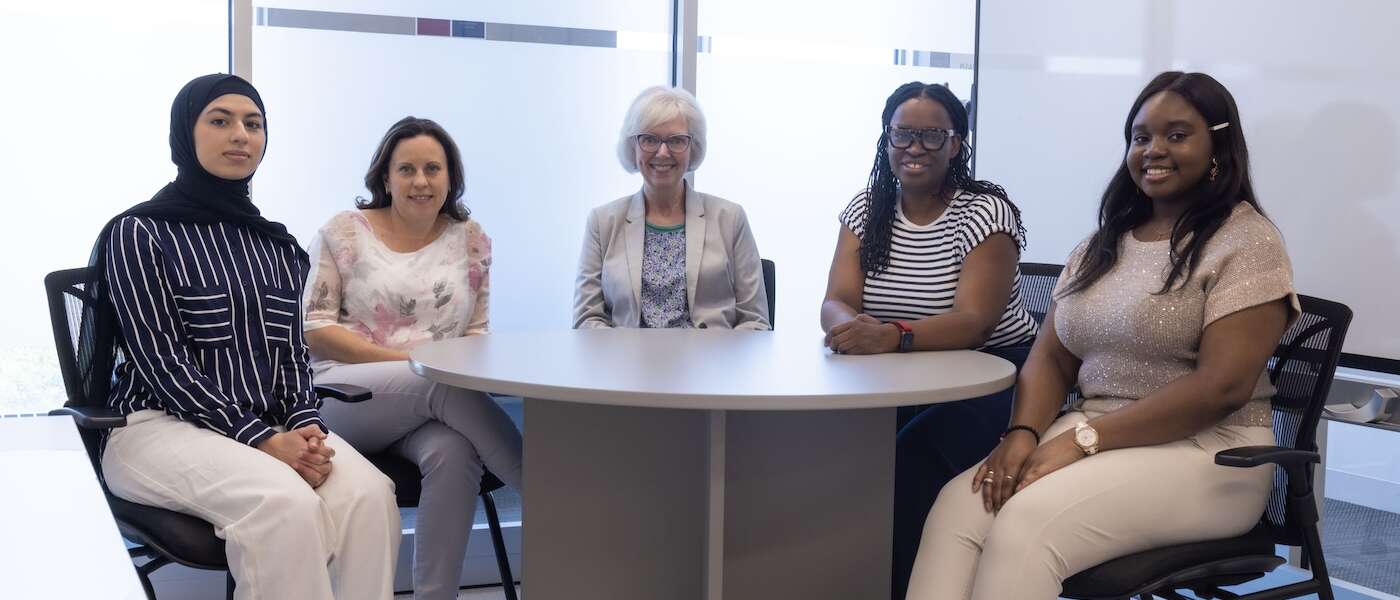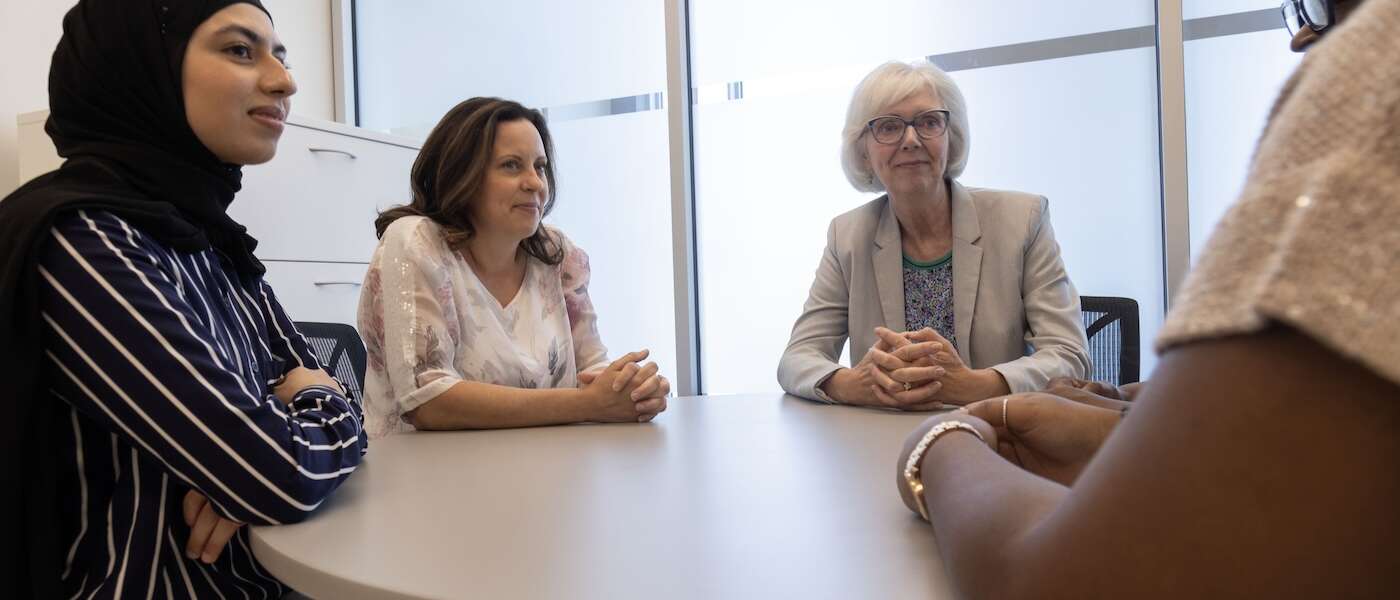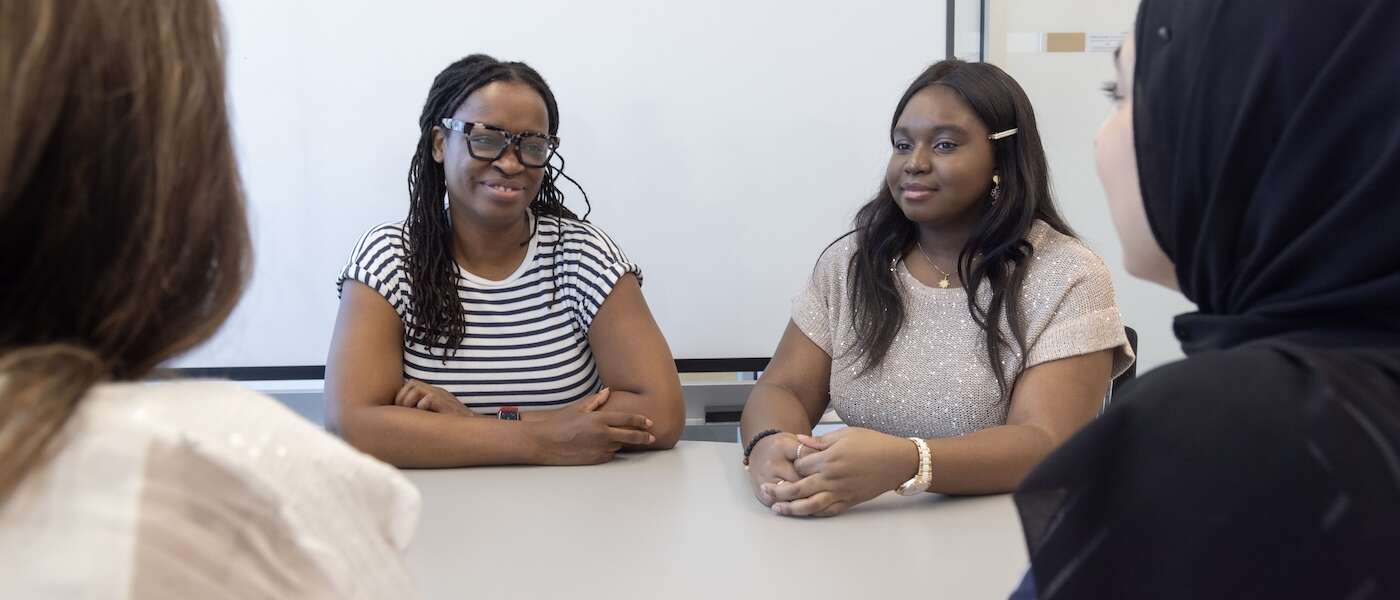Dr. Turkstra is Assistant Dean and Professor of Speech-Language Pathology in the School of Rehabilitation Sciences, a faculty member in the Graduate Neuroscience Program at McMaster. Dr. Turkstra is a speech-language pathologist by training, and her research focuses on links between cognitive function and social communication in individuals with acquired brain injury. She conducts both experimental and translational research on communication in adolescents and adults, and collaborates on development of practice standards to translate research findings into improved clinical practice. Dr. Turkstra is an author on over 100 peer-reviewed publications, including evidence-based practice guidelines for intervention in acquired brain injury.
Expandable List
Institute for Applied Health Sciences, Room 403G, McMaster University
1400 Main Street West
Email: turkstrl@mcmaster.ca
Office Phone: (905) 525-9140 x28648
Professor, School of Rehabilitation Science, McMaster University
Faculty Member, Graduate Program in Neuroscience, McMaster University
Assistant Dean, Speech-Language Pathology Program, School of Rehabilitation Science, McMaster University
Cahill PT, Ferro MA, Ng S, Turkstra LS, Campbell WN. Core outcomes for speech-language services in Ontario schools: a group concept mapping study and guiding framework. BMC Health Serv Res. Mar 16 2024;24(1):347. doi:10.1186/s12913-024-10821-7
Cahill PT, Ng S, Turkstra LS, Ferro MA, Campbell WN. Exploring the valued outcomes of school-based speech-language therapy services: a sequential iterative design. Front Rehabil Sci. 2024;5:1290800. doi:10.3389/fresc.2024.1290800
Hamilton J, Sohlberg MM, Turkstra L. Opening the black box of cognitive rehabilitation: Integrating the ICF, RTSS, and PIE. Int J Lang Commun Disord. Mar-Apr 2024;59(2):559-571. doi:10.1111/1460-6984.12774
*Hou Y, *Zhou A, *Brooks L, *Reid D, Turkstra L, MacDonald S. Rehabilitation access for individuals with cognitive-communication challenges after traumatic brain injury: A co-design study with persons with lived experience. Int J Lang Commun Disord. Mar-Apr 2024;59(2):648-664. doi:10.1111/1460-6984.12895
Hu Y, Lim J, *Kakonge L, Mitchell JT, Johnson HL, Turkstra LS, Duff MC, Toma CL, & Mutlu B. (2024) SMART-TBI: Design and Evaluation of the Social Media Accessibility and Rehabilitation Toolkit for Users with Traumatic Brain Injury. Assets 24, October 27–30, 2024, St. John’s, NL, Canada. doi:10.1145/3663548.3675641
O’Grady HK, Ball I, Berney S, Burns KEA, Cook DJ, Fox-Robichaud A, Herridge MS, Karachi T, Mathur S, Reid JC, Rochwerg B, Rollinson T, Rudkowski JC, Bosch J, Turkstra LS, Kho ME.Characterizing usual-care physical rehabilitation in Canadian intensive care unit patients: a secondary analysis of the Canadian multicentre Critical Care Cycling to Improve Lower Extremity Strength pilot randomized controlled trial. Can J Anesth/J Can Anesth (2024). https://doi.org/10.1007/s12630-024-02838-7
Passaretti, B., Missiuna, C., Levinson, J.A., Turkstra, L.S., Gallagher, T., FIRST Development Team, & Campbell, W. (2024). Development and Evaluation of an Online Professional Development Course to Support Delivery of Tiered School-Based Rehabilitation Services. Disability and Rehabilitation. https://dx.doi.org/10.1080/09638288.2024.2417769
Toma CL, Hwang J, *Kakonge L, et al. Does Facebook Use Provide Social Benefits to Adults with Traumatic Brain Injury? Cyberpsychol Behav Soc Netw. Mar 2024;27(3):214-220. doi:10.1089/cyber.2023.0211
Van Stan JH, Roy N, Stemple J, et al. Rehabilitation Treatment Specification System: Content and Criterion Validity Across Evidence-Based Voice Therapies for Muscle Tension Dysphonia. Am J Speech Lang Pathol. Jul 3 2024;33(4):1774-1791. doi:10.1044/2024_AJSLP-23-0036
Sohlberg, M.M., Hamilton, J., & Turkstra, L.S. (2023). Transforming Cognitive Rehabilitation. NY: Guilford Press.
Anderson, V., Darling, S., Hearps, S., Darby, D., Dooley, J., McDonald, S., Turkstra L.S., et al. (2023) Deep phenotyping of socio-emotional skills in children with typical development, neurodevelopmental disorders, and mental health conditions: Evidence from the PEERS. PloS one,18(10), 1-17.
Bayley, M.T., Janzen, S., Harnett, A., Bragge, P., Togher, L., Kua, A., Patsakos, E., Turkstra, L.S., et al. (2023). INCOG 2.0 Guidelines for Cognitive Rehabilitation Following Traumatic Brain Injury: What’s Changed From 2014 to Now? The Journal of Head Trauma Rehabilitation, 38(1), 1-6.
Clough, S., Tanguay, A.F.N., Mutlu, B., Turkstra, L.S. & Duff, M.C. (2023). How do Individuals with Traumatic Brain Injury Interpret Emoji? Similarities and Differences in Perceived Valence, Arousal, and Emotion Representation. Brain Injury, 37(7), 596-610.
Hou, Y., Zhou, A., Brooks, L., Reid, D., Turkstra, L.S. & MacDonald, S. (2023). Rehabilitation access for individuals with cognitive-communication challenges after traumatic brain injury: A co-design study with persons with lived experience. International Journal of Language & Communication Disorders, 59(2), 648-664.
Hu, Y., Lim, H., Johnson, H.L., O’Shaughnessy, J.M., Kakonge, L., Turkstra, L.S., Duff, M.C., Toma, C. & Mutlu B. (2023). Investigating day-to-day experiences with conversational agents by users with traumatic brain injury. ASSETS ’23: Proceedings of the 25th International ACM SIGACCESS Conference on Computers and Accessibility, 54, 1-15.
Lim, H., Kakonge, L., Hu, Y., Turkstra, L.S., Duff, M., Toma, C., et al. (2023). So, I can feel normal: Participatory design for accessible social media sites for individuals with traumatic brain injury. CHI ’23: Proceedings of the 2023 CHI Conference on Human Factors in Computing Systems, 335, 1-19.
Passaretti, B., Turkstra. L.S., Gallagher, T., Jiang, A., Cahill, P. & Campbell, W. (2023). Reporting of Classroom-Based Morphological Awareness Instruction and Intervention for Kindergarten to Grade 3 Students in the Literature: A Scoping Review. Language, Speech, and Hearing Services in Schools, 54(2), 648-69.
Togher, L., Douglas, D., Turkstra, L.S., Welch-West, P., Janzen, S., Patsakos, E., Harnett, A., Ponsford, J. Teasell, R., Bayley, M., & Wiseman-Hakes, C. (2023). Updated INCOG Guidelines for Cognitive Rehabilitation Following Traumatic Brain Injury: Cognitive-Communication Disorders. J Head Trauma Rehabil 38(1):65-82.
Turkstra, L. S., Salanki, K., MacIntyre, E., *Kim, N., Jin, J., Sprague, S., . . . Bhandari, M. (2023). What is the prevalence of intimate partner violence and traumatic brain injury in Fracture Clinic patients? Clin Ortho Related Research. 481:132-142.
Ahmadi, R., Lim, H., Mutlu, B., Duff, M. C., Toma, C., & Turkstra, L. S. (2022). Facebook experiences of users with TBI: A think-aloud study. JMIR Rehabilitation and Assistive Technologies, 9(4)
Anderson, E., Leong, K., Lyubchenko, K., Young, J., Wiseman-Hakes, C., & Turkstra, L. S. (2022). A Scoping Review of the Role of Speech-Language Pathologists in Youth Justice with Application to Canada. CJSLP, 46(4), 237-250.
Cahill, P. T., Ng, S., Dix, L., Ferro, M. A., Turkstra, L., & Campbell, W. N. (2022). Outcomes management practices in tiered school-based speech–language therapy: A Canadian example. International Journal of Language & Communication Disorders, n/a(n/a).
Kakonge, L., Charron, V. P., Vedder, J., Wormald, K., & Turkstra, L. S. (2022). A mapping review of adolescent identity after TBI: what clinicians need to know. Neuropsychological Rehabilitation, 1-36.
Manoranjan, B., Scott, T., Szasz, O. P., Bzovsky, S., O’Malley, L., Sprague, S., . . . Turkstra, L. S. (2022). Prevalence and Perception of Intimate Partner Violence-Related Traumatic Brain Injury. Journal of Head Trauma Rehabilitation, 37(1), 53-61.
Norman, R. S., Mueller, K. D., Huerta, P., Shah, M. N., Turkstra, L. S., & Power, E. (2022). Discourse Performance in Adults With Mild Traumatic Brain Injury, Orthopedic Injuries, and Moderate to Severe Traumatic Brain Injury, and Healthy Controls. Am J Speech Lang Pathol, 31(1), 67-83.
O’Grady, H. K., Farley, C., Takaoka, A., Mayens, E., Bosch, J., Turkstra, L., & Kho, M. E. (2022). Retention in RCTs of physical rehabilitation for adults with frailty: a systematic review and meta-analysis. Trials, 23(1), 235.
Whyte, J., Van Stan, J., & Turkstra, L. (2022). For the Rehabilitation Treatment Specification Networking Group of the American Congress of Rehabilitation Medicine. Specifying aphasia therapies. Letter to the Editor. Arch Phys Med Rehabil. 103(6), P1242-P1244.
Bootsma, J. N., Turkstra, L. S., & Gorter, J. W. (2021). Expression of propositional attitudes in conversation by adults with traumatic brain injury: A relevance theoretic approach. Int J Lang Commun Disord, 1-14.
Hardin, K. Y., Black, C., Caldbick, K., Kelly, M., Malhotra, A., Tidd, C., . . . Turkstra, L. S. (2021). Current Practices Among Speech-Language Pathologists for Mild Traumatic Brain Injury: A Mixed-Methods Modified Delphi Approach. American Journal of Speech-Language Pathology, 30(4), 1625-1655.
Valera, E. M., Joseph, A. C., Snedaker, K., Breiding, M. J., Robertson, C. L., Colantonio, A., Levin, H., Pugh, M. J., Yurgelun-Todd, D., Mannix, R., Bazarian, J. J., Turtzo, L. C., Turkstra, L. S., Begg, L., Cummings, D. M. Bellgowan, P. S. F. (2021). Understanding Traumatic Brain Injury in Females: A State-of-the-Art Summary and Future Directions. Journal of Head Trauma Rehabilitation, 36(1), E1-e17.
Turkstra, L.S., Mutlu, B., Ryan, C.W., Despins Stafslien, E.H., Richmond, E.K., Hosokawa, E. & Duff, M.C. (2020). Sex and gender differences in emotion recognition and Theory of Mind after TBI: A narrative review and directions for future research. Frontiers in Neurology, 11, 59.
Flynn, M.A., Rigon, A., Kornfield, R., Mutlu, B., Duff, M.C., Turkstra, L.S. (2019). Characterizing computer-mediated communication, friendship, and social participation in adults with traumatic brain injury. Brain Injury, 33(8), 1097-1104.
Hart, T., Dijkers, M.P., Whyte, J., Turkstra, L.S., et al. (2019). A Theory-Driven System for the Specification of Rehabilitation Treatments. Archives of Physical Medicine and Rehabilitation, 100, 172-80.
Mutlu, B., Duff, M. & Turkstra, L. (2019) Social-cue perception and mentalizing ability following traumatic brain injury: A human-robot interaction study. Brain Injury, 33, 23-31.
Norman RS, Shah MN, Turkstra LS. (2019). Language Comprehension After Mild Traumatic Brain Injury: The Role of Speed. American Journal of Speech-Language Pathology, 28(4), 1479-1490.
Mueller, K. D., Koscik, R. L., Hermann, B. P., Johnson, S. C., & Turkstra, L. S. (2018). Declines in Connected Language Are Associated with Very Early Mild Cognitive Impairment: Results from the Wisconsin Registry for Alzheimer’s Prevention. Frontiers in Aging Neuroscience, 9(January), 1–14.
Turkstra, L. S., Norman, R. S., Mutlu, B., & Duff, M. C. (2018). Impaired theory of mind in adults with traumatic brain injury: A replication and extension of findings. Neuropsychologia, 111, 117–122.
Byom, L., & Turkstra, L. S. (2017). Cognitive task demands and discourse performance after traumatic brain injury. International Journal of Language & Communication Disorders, 52(4), 501–513.
Despins, E. H., Turkstra, L. S., Struchen, M. A., & Clark, A. N. (2016). Sex-based differences in perceived pragmatic communication ability of adults with traumatic brain injury. Archives of Physical Medicine and Rehabilitation, 97(2), S26–S32.
Turkstra, L. S., Clark, A., Burgess, S., & Hengst, J. (2016). Pragmatic communication abilities in children and adults: implications for rehabilitation professionals. Disability andRehabilitation,
Turkstra, L. S. (2016). Rehabilitation for Adults with Traumatic Brain Injury: Where Will We Be Clinically in 2026? Seminars in Speech and Language, 37(3), 225–227.
Turkstra, L. S., Norman, R., Whyte, J., Dijkers, M., & Hart, T. (2015). Knowing What We’re Doing: Why Specification of Treatment Methods Is Critical for Evidence-Based Practice in Speech-Language Pathology. American Journal of Speech-Language Pathology, 25, 164–171.
Turkstra, L. S., Politis, A. M., & Forsyth, R. (2015). Cognitive-communication disorders in children with traumatic brain injury. Developmental Medicine and Child Neurology, 57(3), 217–222.
Turkstra, L. S., Abbeduto, L., & Meulenbroek, P. (2014). Social cognition in adolescent girls with fragile X syndrome. American Journal on Intellectual and Developmental Disabilities, 119(4), 319–339.
Turkstra, L. S. (2013). Inpatient Cognitive Rehabilitation: Is It Time for a change? Journal of Head Trauma Rehabilitation, 28(4), 332–336.
Turkstra, L. S. (2008). Conversation-based assessment of social cognition in adults with traumatic brain injury. Brain Injury, 22(5), 397–409.
Turkstra, L. S., Williams, W. H., Tonks, J., & Frampton, I. (2008). Measuring social cognition in adolescents: implications for students with TBI returning to school. NeuroRehabilitation, 23(6), 501–9.
Turkstra, L. S. (2005). Looking While Listening and Speaking. Journal of Speech, Language, and Hearing Research, 48, 1429–1441.
- Fiona Campbell, PhD Student, School of Rehabilitation Science, McMaster University
- Lisa Kakonge, PhD Student, School of Rehabilitation Science, McMaster University
- Marie-France Perrier, PhD Student (Co-Supervisor with Heather Flowers), University of Ottawa
- Adam Politis, PhD Student, School of Rehabilitation Science, McMaster University





